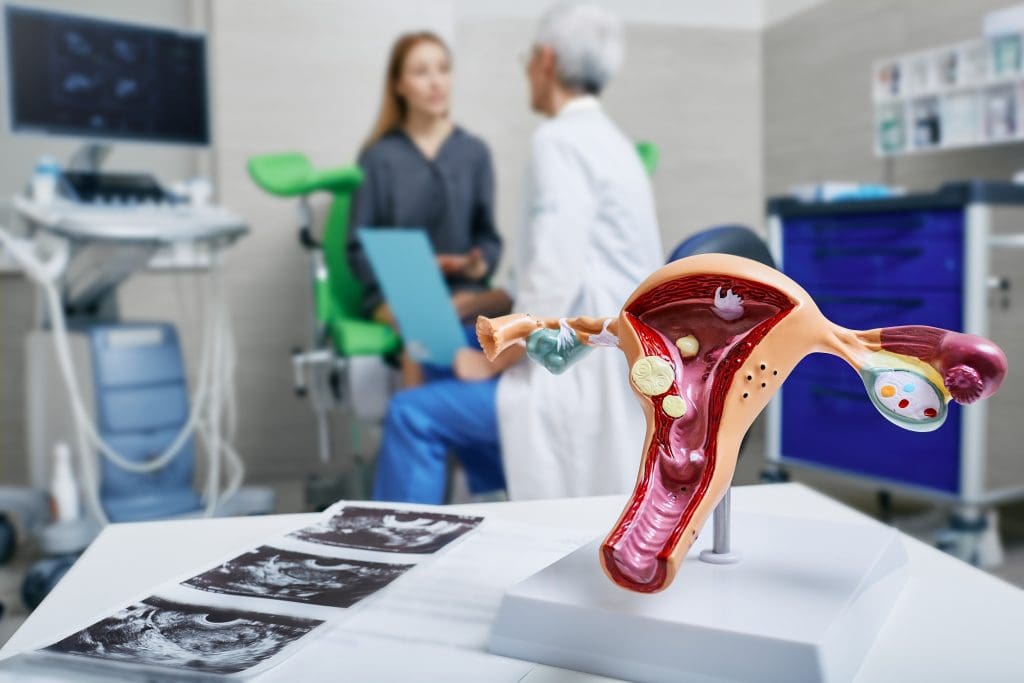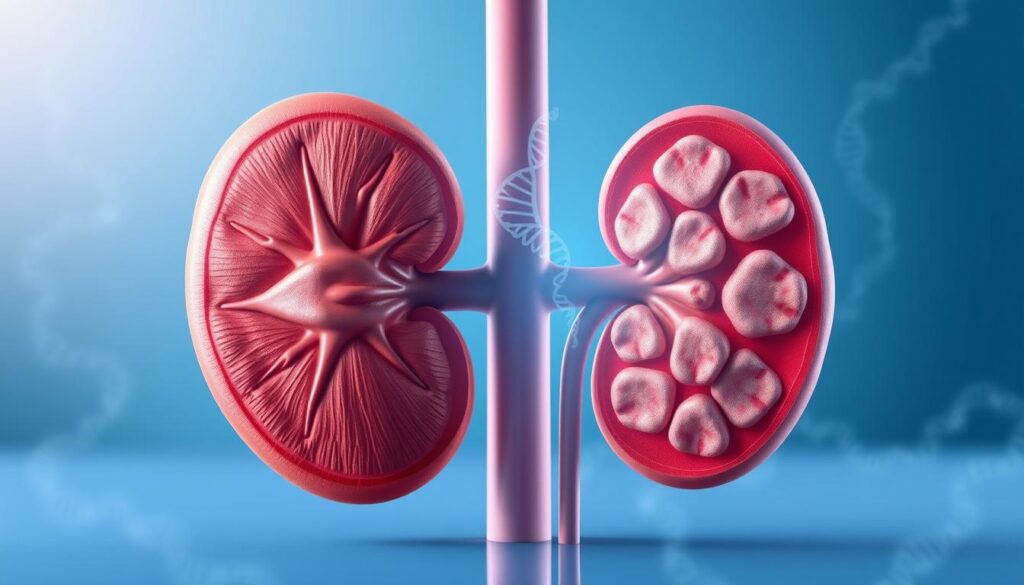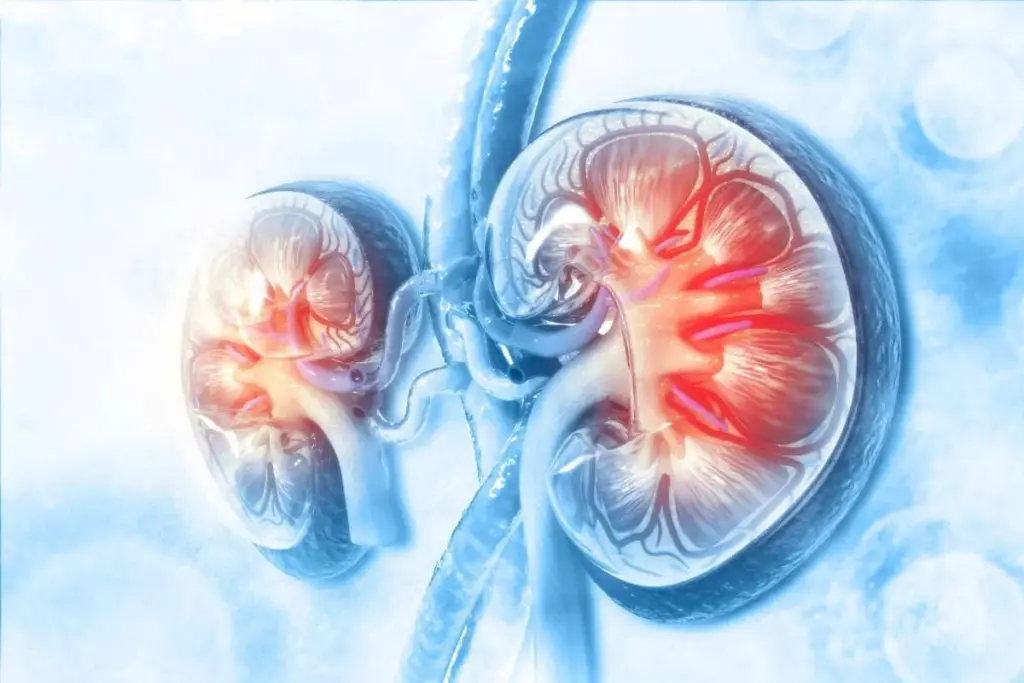Cancers of the female reproductive system hit thousands of women every year. Gynecologic oncology is a special field of medicine. It deals with diagnosing, treating, and managing these cancers. This includes ovarian, uterine, vaginal, cervical, and vulvar cancers. Patients often ask, “What is gynecologic oncology? since it’s a highly specialized branch of cancer care focused on women’s reproductive health.
A gynecologic oncologist is a doctor with extra training. They focus on caring for women with these cancers. They offer complete care to help patients get better.

Key Takeaways
- Gynecologic oncology focuses on cancers of the female reproductive system.
- Gynecologic oncologists provide specialized care for women with these cancers.
- The field encompasses diagnosis, treatment, and management of various gynecologic cancers.
- Advanced training enables gynecologic oncologists to offer complete care.
- Multidisciplinary approaches are used to improve patient outcomes.
The Field of Gynecologic Oncology
Gynecologic oncology is a special area of medicine. It deals with cancers in the female reproductive system. Doctors in this field give detailed care to women with these cancers.
Definition and Scope of the Specialty
This specialty covers cancers in the ovaries, cervix, uterus, vagina, and vulva. Gynecologic oncologists use surgery and medicine to treat these cancers. They use many different treatments.
History and Development of the Field
The field of gynecologic oncology has grown a lot. New surgery and treatment methods have helped patients more. Multidisciplinary care has also improved life and survival for women with these cancers.
Aspect | Description | Impact |
| Surgical Techniques | Advancements in surgical methods for cancer removal | Improved patient outcomes and reduced recovery times |
| Chemotherapy Protocols | Development of targeted chemotherapy regimens | Enhanced effectiveness in treating gynecologic cancers |
| Multidisciplinary Care | Integration of various medical specialties in cancer treatment | Better overall care and improved survival rates |
Importance in Women’s Healthcare
Gynecologic oncologists are key in women’s healthcare. They offer specialized care for women with gynecologic cancers. Their work helps in early detection and treatment, improving life quality.
The field keeps growing with new research and treatments. As we learn more about these cancers, we can give better care to those affected.
Types of Gynecologic Cancers
It’s key to know about the different gynecologic cancers. These cancers affect the female reproductive system in various ways. Each type has its own treatment.
Ovarian Cancer
Ovarian cancer is common and often found late. It’s treated with surgery and chemotherapy. Knowing the risks and symptoms can help catch it early.
Cervical Cancer
Cervical cancer is linked to HPV. Thanks to screening and vaccines, it’s less common. Treatment depends on the cancer’s stage, from surgery to chemoradiation.
Uterine and Endometrial Cancer
Uterine and endometrial cancers are common. They often show abnormal bleeding. Surgery is a main treatment, sometimes with radiation or chemotherapy.
Vaginal Cancer
Vaginal cancer is rare and needs special care. Treatment can be surgery, radiation, or both, based on the cancer’s stage and location.
Vulvar Cancer
Vulvar cancer is rare and affects the outside of the genitals. It’s usually treated with surgery. In advanced cases, radiation or chemotherapy might be added.
Fallopian Tube Cancer
Fallopian tube cancer is rare and hard to diagnose. It’s treated with surgery and chemotherapy, similar to ovarian cancer.
Gestational Trophoblastic Disease
Gestational trophoblastic disease is rare and happens during pregnancy. It involves abnormal cell growth in the uterus. Treatment is usually chemotherapy, and the outlook is good with proper care.
Each gynecologic cancer needs a specific treatment plan. This highlights the need for accurate diagnosis and specialized care.
The Role of a Gynecologic Oncologist
Gynecologic oncologists are experts in treating gynecologic cancers. They handle diagnosis, treatment, and management of cancers affecting women’s reproductive health. Their work is critical in helping women with these serious health issues.
Specialized Training and Qualifications
Gynecologic oncologists have a lot of training. They start with a residency in obstetrics and gynecology. Then, they do a fellowship in gynecologic oncology.
This education prepares them to handle both surgical and medical treatments for gynecologic cancers. They are ready to tackle complex cases and give patients the care they need.
Multidisciplinary Approach to Care
Working in a team is a big part of a gynecologic oncologist’s job. They team up with radiologists, pathologists, and medical oncologists. Together, they create treatment plans that fit each patient’s needs.
This teamwork ensures patients get the best care possible. It’s a key part of a gynecologic oncologist’s role.
Differences Between Gynecologists and Gynecologic Oncologists
General gynecologists focus on women’s reproductive health. But, gynecologic oncologists are trained to deal with gynecologic cancers. They have the skills to handle complex cancer cases.
This makes them uniquely qualified to provide both surgical and medical treatments for these cancers.
Surgical Expertise and Capabilities
Surgery is a big part of a gynecologic oncologist’s job. They are skilled in performing surgeries needed for cancer diagnosis, staging, and treatment. Their skills include radical surgeries and cytoreductive surgery.
Key aspects of a gynecologic oncologist’s surgical expertise include:
- Radical surgeries for cancer removal
- Cytoreductive surgery to reduce tumor size
- Minimally invasive surgical techniques when appropriate
- Complex pelvic surgery for cancer staging and treatment
By combining their surgical skills with a team approach, gynecologic oncologists are vital in improving outcomes for women with gynecologic cancers.
Diagnostic Procedures in Gynecologic Oncology
Diagnostic procedures are key in finding and treating gynecologic cancers. They help doctors make accurate diagnoses and plan treatments.
Screening Tests and Early Detection
Screening tests are important for catching gynecologic cancers early. The Pap smear is a well-known test for cervical cancer. It can spot changes before they turn into cancer.
Other tests like HPV testing and pelvic exams also help. They help find problems early, making treatment easier.
Imaging Techniques
Imaging like ultrasound, CT scans, and MRI help see how far cancer has spread. They show where tumors are and how big they are. This info helps doctors decide the best treatment.
Biopsy Procedures
Biopsies take tissue samples for lab tests. This is key for making a diagnosis and planning treatment. There are different biopsies for different cancers.
Genetic Testing and Biomarkers
Genetic tests and biomarkers help find who’s at high risk. They check for genes like BRCA1 and BRCA2. This helps doctors know how to treat better.
Staging and Classification Systems
Staging systems, like the FIGO system, classify cancer spread. Knowing the stage is important for treatment planning. It helps doctors choose the right treatment, like surgery or medicine.
Key Diagnostic Procedures:
- Screening tests (Pap smear, HPV testing)
- Imaging techniques (ultrasound, CT scans, MRI)
- Biopsy procedures (punch biopsy, cone biopsy)
- Genetic testing (BRCA1 and BRCA2)
- Staging systems (FIGO staging)
Treatment Approaches in Gynecologic Oncology
Gynecologic oncology uses many treatment methods, each chosen based on the cancer type and stage. The treatment plan considers the patient’s health, the cancer type, and how far it has spread.
Surgical Interventions
Surgery is key in treating many gynecologic cancers. It can range from major surgery to less invasive methods.
Radical Surgery
Radical surgery removes cancer and nearby tissues and lymph nodes. It’s used for cancers that are mostly contained but need to be removed thoroughly.
Minimally Invasive Techniques
Techniques like laparoscopy and robotic surgery are alternatives to open surgery. They help in quicker recovery and less scarring.
Chemotherapy Protocols
Chemotherapy uses drugs to kill cancer cells. It’s often used with surgery and radiation to improve treatment results.
Radiation Therapy Options
Radiation therapy kills cancer cells with high-energy rays. It can be given from outside or inside the body, depending on the cancer’s location and size.
| Treatment Modality | Description | Application |
| Surgery | Removal of cancerous tissue | Localized cancers |
| Chemotherapy | Systemic drug treatment | Advanced or metastatic disease |
| Radiation Therapy | High-energy rays to kill cancer cells | Localized or regional disease |
Targeted Therapies and Immunotherapy
Targeted therapies and immunotherapy are new ways to fight gynecologic cancers. They target specific cancer cells or boost the immune system’s fight against cancer.
Hormone Therapy
Hormone therapy is used for cancers like endometrial cancer. It works by controlling hormones that help cancer grow.
Integrative and Supportive Care
Integrative and supportive care are vital parts of cancer treatment. They help with physical, emotional, and social needs, improving patients’ lives during treatment.
The Patient Journey Through Gynecologic Oncology
Getting a diagnosis of gynecologic cancer can be scary. It involves many steps from diagnosis to survivorship. A supportive and detailed approach is needed.
Initial Consultation and Diagnosis
The first visit is key. It helps patients understand their diagnosis and treatment options. They get checked thoroughly, which may include tests and biopsies to confirm the cancer type.
Treatment Planning and Decision-Making
Planning treatment is a team effort. It considers the cancer type, stage, and the patient’s health and wishes. A personalized plan might include surgery, chemotherapy, or radiation.
Managing Treatment Side Effects
Handling side effects is important. Treatments can affect quality of life. Patients may face fatigue, nausea, or long-term effects like infertility. Good management is key.
Survivorship and Follow-up Care
Survivorship and follow-up care are important. They focus on watching for cancer return and meeting ongoing needs. Regular check-ups help catch issues early and offer support.
Psychological and Emotional Support
Psychological and emotional support are also key. A cancer diagnosis affects well-being. Counseling, support groups, and resources help patients deal with their feelings.
A supportive team is essential in the patient journey. They address physical, emotional, and psychological needs. This helps patients face their diagnosis and treatment with confidence.
Risk Factors and Prevention of Gynecologic Cancers
Knowing the risk factors for gynecologic cancers is key to preventing and catching them early. These cancers affect the female reproductive system, including ovarian, cervical, uterine, vaginal, and vulvar cancers.
Genetic and Hereditary Factors
Genetic and hereditary factors are big players in some gynecologic cancers. For example, BRCA1 and BRCA2 gene mutations raise the risk of ovarian and breast cancers. If you have a family history of these cancers, getting genetic counseling is a good idea.
Lifestyle and Environmental Factors
Lifestyle and environmental factors also impact gynecologic cancer risk. Obesity is linked to uterine cancer, while smoking increases the risk of cervical and vulvar cancers. Knowing these risks can help you take steps to prevent them.
Preventive Strategies and Screenings
There are preventive steps for some gynecologic cancers. Regular Pap smears can catch cervical cancer early. If you’re at high risk, you might need more frequent screenings and preventive actions.
HPV Vaccination and Cervical Cancer Prevention
The HPV vaccine is a big help in preventing cervical cancer. It protects against certain HPV strains, lowering the risk of cervical cancer.
Genetic Counseling for High-Risk Individuals
Genetic counseling is vital for those with a family history of gynecologic cancers. It helps identify high-risk individuals and guides them on preventive steps, like more frequent screenings or surgery.
| Risk Factor | Associated Cancer | Preventive Measure |
| Genetic Mutations (BRCA1, BRCA2) | Ovarian, Breast Cancer | Genetic Counseling, Prophylactic Surgery |
| Obesity | Uterine Cancer | Weight Management |
| Smoking | Cervical, Vulvar Cancer | Smoking Cessation |
| HPV Infection | Cervical Cancer | HPV Vaccination |
When to See a Gynecologic Oncologist
Knowing when to visit a gynecologic oncologist is key for early diagnosis and treatment of gynecologic cancers. These doctors specialize in cancers of the female reproductive system.
Warning Signs and Symptoms
Look out for abnormal vaginal bleeding, pelvic pain, and changes in bowel or bladder habits. These signs could point to ovarian, cervical, or uterine cancer.
Referral Process from Primary Care
The referral process from your primary care doctor is vital. They can spot symptoms or test results that suggest gynecologic cancer. Then, they’ll refer you to a gynecologic oncologist for a closer look.
Preparing for Your First Appointment
Before your first visit, collect important medical info. This includes past medical records, family history, and a list of symptoms. Being ready helps make the most of your consultation.
Questions to Ask Your Doctor
Make a list of questions to ask your gynecologic oncologist. Ask about diagnosis, treatment options, and possible side effects. This way, you’ll be well-informed and active in your care.
Advancements in Gynecologic Oncology
Gynecologic oncology is changing fast with new tech and treatments. This field is making big strides in many areas. It’s helping patients live better and longer.
Emerging Treatment Technologies
New treatments like targeted therapies and immunotherapy are giving patients new hope. These methods are more precise and cause fewer side effects than old treatments.
Clinical Trials and Research
Clinical trials and research are key to finding better treatments. They help us learn what works best for gynecologic cancers. Studies are looking into new chemotherapy and surgery methods.
Precision Medicine Approaches
Precision medicine is playing a big role in gynecologic oncology. It means treatments are tailored to each patient’s cancer. This makes treatments more effective and reduces harm.
Robotic and Advanced Surgical Techniques
Robotic and advanced surgery are changing how we operate. They make surgeries more precise and reduce recovery times. This means patients can get back to their lives sooner.
Future Directions in the Field
The future of gynecologic oncology looks bright. It will see more use of new tech and research into cancer biology. The goal is to find even better treatments and care for patients.
Finding the Right Gynecologic Oncologist
When you get a gynecologic cancer diagnosis, finding the right oncologist is key. It can greatly affect your treatment’s success. There are important steps to take to make the best choice for your care.
Evaluating Credentials and Experience
Start by checking the oncologist’s credentials and experience. Look at their medical training, board certification, and cancer treatment experience. Choose oncologists who are board-certified in gynecologic oncology and have a good success rate.
Questions to Ask Your Oncologist
Asking the right questions during your first visit is important. Ask about their experience with your cancer type. Find out about treatment options and which they suggest. Also, ask how they plan to handle any side effects.
Insurance and Accessibility Considerations
Insurance and how easy it is to get to the oncologist are key. Make sure your chosen oncologist is in your insurance network. Also, think about the location and how easy it is to get there.
Second Opinion Importance
Getting a second opinion is common and wise in gynecologic oncology. It gives you more views on your diagnosis and treatment. This helps you make a better decision.
Online Resources and Physician Directories
Online tools and directories can help find a good gynecologic oncologist. Use them to research doctors, read reviews, and check their credentials.
By carefully looking at credentials, asking the right questions, and considering insurance and location, you can find a great oncologist. Don’t forget to get a second opinion and use online resources. This way, you can get the best care for your needs.
Conclusion
Gynecologic oncology is key in fighting cancers in the female reproductive system. It deals with many types of cancers, like ovarian, cervical, and uterine cancers. It also covers vaginal and vulvar cancers.
New ways to diagnose and treat these cancers are making a big difference. This means better care for women with these diseases. The future looks bright for gynecologic oncology, promising even better care for patients.
In short, gynecologic oncology is vital for women’s health worldwide. As science and technology keep advancing, we can expect even better treatments and results for patients.
* Liv Hospital Editorial Board has contributed to the publication of this content .
* Contents of this page is for informational purposes only. Please consult your doctor for diagnosis and treatment. The content of this page does not include information on medicinal health care at Liv Hospital .
For more information about our academic and training initiatives, visit Liv Hospital Academy
Frequently Asked Questions
What is gynecologic oncology?
Gynecologic oncology is a medical field that focuses on cancers of the female reproductive system. This includes cancers of the ovaries, uterus, vagina, cervix, and vulva.
What is the role of a gynecologic oncologist?
A gynecologic oncologist is a doctor who specializes in treating cancers of the female reproductive system. They use surgery, chemotherapy, and other treatments to help patients.
What are the different types of gynecologic cancers?
Gynecologic cancers include cancers of the ovaries, cervix, uterus, vagina, and vulva. They also include cancers of the fallopian tubes and gestational trophoblastic disease. Each type needs a specific approach to diagnosis and treatment.
How are gynecologic cancers diagnosed?
Doctors use several methods to diagnose gynecologic cancers. These include Pap smears, ultrasound, MRI, biopsies, genetic tests, and staging systems. These help determine the extent of the disease.
What are the treatment options for gynecologic cancers?
Treatment options include surgery, chemotherapy, radiation, targeted therapies, immunotherapy, hormone therapy, and supportive care. The choice depends on the type and stage of cancer.
How do I know if I need to see a gynecologic oncologist?
You should see a gynecologic oncologist if you have symptoms like abnormal bleeding, pelvic pain, or changes in bowel or bladder habits. Your primary care provider may also refer you if they find something suspicious.
What should I expect during my first appointment with a gynecologic oncologist?
At your first appointment, you’ll have a detailed evaluation. This includes a review of your medical history, discussing your symptoms, and possibly diagnostic tests. The goal is to understand your condition and plan your treatment.
How do I find a qualified gynecologic oncologist?
Look for a gynecologic oncologist with the right credentials and experience. Ask questions during your first visit. Consider insurance and location. If unsure, get a second opinion and use online resources and directories to help.
What are some emerging trends in gynecologic oncology?
New trends include better treatments like targeted therapies and immunotherapy. There’s also precision medicine, advanced surgery, and ongoing research into cancer biology. These aim to improve patient care.
Can gynecologic cancers be prevented?
While not all cancers can be prevented, some steps can help. These include the HPV vaccine, Pap smears, and lifestyle changes. Genetic counseling can also identify those at high risk.









